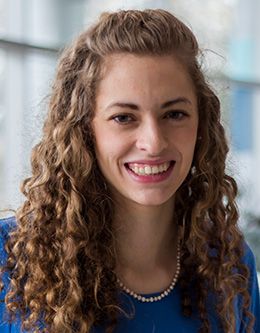Hi, everybody! To all of you—graduates, parents, and other supporters—thank you so much for being here, and thank you even more for what you have done to get here. I also want to say thank you to those who have helped me get here. To my sweet husband, my parents, my siblings, and all my extended family, thank you for your wonderful encouragement and support.
I will start by letting you all know that I do not feel particularly qualified to address you, much less able to give you any life advice. After all, most of us are pretty much in the same stage of life. So what I want to do today is just share a story, an experience, and a thought. I hope this will be both meaningful and somewhat entertaining.
The Story
Once upon a time there were two men named James Watson and Francis Crick. They went on a quest to discover the structure of DNA, arguably the most important molecule in the universe. As you might guess, there were also other people on that same quest. There was a physicist named Max Delbrück, who had made some speculations based on quantum physics, and there was a biochemist named Erwin Chargaff, who was studying the chemical makeup of the molecule. There was also Rosalind Franklin, an X-ray crystallographer who was focusing on visualizing the crystal structure of DNA.
All of these scientists contributed important information to the discovery, but none of them was actually able to figure it out. So, back to our heroes, Watson and Crick. These two connected the dots between all the pieces of information from the other scientists and correctly solved the puzzle. Because they made connections between different branches of science, they were able to see a bigger picture that nobody just working within their own narrow fields could have ever seen. Brilliant, right?
My Experience
Now let me share my experience. It is somewhat related. I was a molecular biology major finishing my first semester at BYU when my attention was caught by a paper taped to one of the doors at the JKB, where I attended church. It was an advertisement for the editing minor, and it changed my life. Something told me that I just had to find out more, and before I knew it, I was registered for the first class in the minor.
As I finished out the rest of my time at BYU as a science major with a humanities minor, I got this comment a lot: “Wow! So how do those fit together?” In some ways they don’t. But for me, the most rewarding things I have done at BYU have come as I have found opportunities to combine my diverse interests—like working on writing curricula for science classes and writing magazine articles for the College of Life Sciences magazine. Connecting the different parts of my education has been a huge blessing for me.
The Thought
That brings me to the thought that I would like to share with you. I think that making our lives as connected as possible is helpful. This doesn’t just apply in the academic world, where we make connections between ideas and disciplines. It also applies in our daily living, in the way we connect truths we know in our hearts with decisions about our words and actions. It is not easy. I don’t think any of us will go through life without facing situations in which we will feel tremendous pressure to disconnect our words or our actions from our knowledge of what is right—whether it be a high-stakes social situation, an important business deal, or an uncomfortable question from an angry accuser.
President Thomas S. Monson gave us a good guide for such times. He asked:
Are you the same person wherever you are and whatever you are doing—the person our Heavenly Father wants you to be and the person you know you should be? [“Be Strong and of a Good Courage,” Ensign, May 2014]
I think there is a lot of spiritual safety and peace in being able to answer yes to that question—in knowing that all the parts of your life are firmly connected back to the most important truths of Christ’s gospel.
In summary, when we make connections between different aspects of living—the physical, the intellectual, the emotional, and the spiritual—we see the big picture more clearly (just as did Watson and Crick with DNA). When we integrate our different talents and interests, we find unexpected opportunities to do good. And, perhaps most important, when we apply the gospel to all aspects of our life, when we avoid compartmentalizing our roles or compromising our values, we stay true to ourselves and connected to our purpose for living. Thank you.
© 2016 Brigham Young University.

Alicia K. Stanton spoke as the representative of her graduating class at BYU commencement on 21 April 2016.

